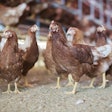
Is cultured meat a threat or opportunity? Is laboratory-grown meat likely to displace chicken and pork first, or beef and lamb, or perhaps it will simply be an alternative with little impact on traditional meat production? The truth is, nobody really knows.
A study starting in the U.K. later this year aims to address these very questions by bringing together farmers, public interest groups, cultured meat businesses and environmental and social scientists, among others.
Cultured meat is generally assumed to pose a threat to farmers, however, as the study’s organizers note, nobody has really looked in-depth into what effects it could actually have on farm businesses, or at who the winners and losers might be, or what policies might influence this.
According to Project Co-Lead, Dr. Alex Sexton, Leverhulme Trust Early Career Research Fellow in Geography at the University of Sheffield, previous research on the impacts of cultured meat has been mostly speculative and focused on the global agricultural picture without much input from farmers.
This project, however, will take a more localized approach to explore what cultured meat could mean for a range of real-life agricultural businesses.
Niche but growing
While few of us have eaten cultured meat, it appears to be getting ever closer to our dinner tables.
A report from management consulting firm McKinsey and Company, published last year. revealed that, since developing the first prototypes, companies have been able to reduce production costs by 99%.
The report continues that, while the sector comprises fewer than 100 start-up businesses, it attracted roughly US$350 million in investments in 2020 from some of the largest animal protein players, including Tyson and Nutreco.
Nevertheless, despite this investment, significantly more would be needed to scale cultured meat to even 1% of the global animal protein market, the report’s authors say, so perhaps nobody needs to be immediately fearful of its impact on animal protein producers.
Among areas to be explored by the U.K. study will be whether, rather than seeing each other as rivals, farmers and cell-based meat businesses could work together to feed the world sustainably. What agricultural ingredients will laboratory meat need and might it, one day, be “craft brewed” on farm?
If laboratory-grown meat does gain broad public and regulatory approval there can be no doubt that it will impact traditional meat production, and by gaining a greater perspective it may be possible to shape the new protein world to take advantage of any opportunities that could be created.















